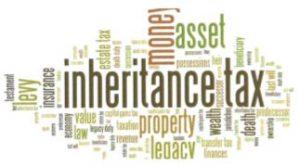Bulletin – January 2018

 We are now in a new tax year and therefore have another set of capital gains tax allowances to use. As the spring and early summer arrive, we believe that you, and we, should “make hay while the sun (hopefully) shines”. Your funds have risen wonderfully and so this is a good time to take stock of your current and future requirements.
We are now in a new tax year and therefore have another set of capital gains tax allowances to use. As the spring and early summer arrive, we believe that you, and we, should “make hay while the sun (hopefully) shines”. Your funds have risen wonderfully and so this is a good time to take stock of your current and future requirements.
Why? Everybody should have £10,000 – £20,000 of cash resources to cover short-term emergency requirements. These can be held in premium bonds (many of you have the maximum which is excellent). In addition, think about having one year’s income in the bank so that should there be a dramatic correction in global markets, you will not need to worry about cash flow.
The future is positive
Therefore, we wish to maintain our investment strategy for several different reasons:
KMG continues to invest in the future. An often-told story about gold and soap continues to dominate our thoughts: the fact is that investing in companies who make a bar of soap is likely to be far more profitable than companies that mine a bar of gold. Even if markets fall 25% (maybe 50%) the population of the world has not gone away and they will continue to wash their hands. The story of soap, therefore, is to look through short-term noise and think about the recovery which always comes about after any big correction in global markets.
KMG has been trading since the end of the Second World War. We have just about seen every possible global phenomenon known and I am sure that the future will be different to the past, but the principles of investment management remain the same.
So:
Two actions:

Patrick McIntosh
 The Conservatives promised in their 2015 manifesto to take the family home out of inheritance tax and raise the threshold for married couples and civil partners to £1m. The first phase of this is now available to anyone who dies after 6 April 2017 with a new allowance called the Residential Nil Rate Band (RNRB) of £100,000 per person available, but not everyone will qualify. However, it is recognised that the new rules are very complicated so do not be surprised by changes post-election.
The Conservatives promised in their 2015 manifesto to take the family home out of inheritance tax and raise the threshold for married couples and civil partners to £1m. The first phase of this is now available to anyone who dies after 6 April 2017 with a new allowance called the Residential Nil Rate Band (RNRB) of £100,000 per person available, but not everyone will qualify. However, it is recognised that the new rules are very complicated so do not be surprised by changes post-election.
You must have had an interest in a residential property which has been your main residence and you must leave it to your direct descendants on death. Direct descendants are classed as your child (step, adopted or foster child) and their direct descendants or their spouse or civil partner.
The maximum available amount of the RNRB will increase yearly and for deaths in the following tax years, it will be as follows:
• £100,000 in 2017/18
• £125,000 in 2018/19
• £150,000 in 2019/20
• £175,000 in 2020/21
This, together with the standard nil rate band of £325,000 each means that by 2020 you could have an estate of £1,000,000 between two of you without paying any inheritance tax; the RNRB saving your estate an extra £140,000 in IHT.
The rules are, however, quite complicated and there are some traps and pitfalls to avoid:
With inheritance tax at 40% it is certainly worth talking to us about the various steps you could take to mitigate the tax that will be due on your estate and to see if the RNRB will be available. We can also write your Will or review an existing Will to ensure it correctly reflects your wishes and is reviewed in line with changing legislation and any change in your circumstances.
New probate fee due May 2017 but will this be implemented?
The government have been trying to push through changes to the probate fee linking the fee to the value of the estate rather than a flat rate fee. The increase in fee is quite substantial rising from a flat rate of £215 up to £20,000 as can be seen in the table below.

Proposed fee
 There has been overwhelming opposition to this hike in fees yet the government have pushed ahead and the fees are due to come into force in May 2017. However, the Parliamentary Joint Committee on Statutory Instruments (SI) have called for full parliamentary scrutiny as they see this change in charges as a tax and not a fee. Parliament looks closely at the government’s tax and spending plans on our behalf and the government cannot raise new taxes without Parliament’s agreement.
There has been overwhelming opposition to this hike in fees yet the government have pushed ahead and the fees are due to come into force in May 2017. However, the Parliamentary Joint Committee on Statutory Instruments (SI) have called for full parliamentary scrutiny as they see this change in charges as a tax and not a fee. Parliament looks closely at the government’s tax and spending plans on our behalf and the government cannot raise new taxes without Parliament’s agreement.
The government must now decide whether or not to proceed with the SI. The SI Committee does not have the power to block it, but can draw parliament’s attention to its failings and invite full parliamentary scrutiny.
For the moment, we are waiting to see what will happen and whether this new fee structure will be implemented, but it is likely to be deferred post the election.
Suzan Harding
 KMG are sponsoring this annual event. It should be a very interesting evening attended by three leading economists: Trevor Williams, Ann Pettifor and James Sproule (both the gentlemen have spoken at previous KMG seminars and Ann provides an interesting alternative point of view). We will hear what they think about BREXIT, Trump and what the up-coming EU elections may have in store for us in what is a historic time.
KMG are sponsoring this annual event. It should be a very interesting evening attended by three leading economists: Trevor Williams, Ann Pettifor and James Sproule (both the gentlemen have spoken at previous KMG seminars and Ann provides an interesting alternative point of view). We will hear what they think about BREXIT, Trump and what the up-coming EU elections may have in store for us in what is a historic time.
If you would like to join us for the event we would be delighted to see you and will happily meet the costs of your attendance.
Places must be registered. The event commences at 6pm with a finish time estimated at 9pm. The venue is Canon UK Headquarters at Reigate in Surrey.
Please contact Kate in our office to book your place: [email protected] or 01342 840 100.
We very much hope you can join us, especially to consider BREXIT post-election.
 Whilst Patrick notes the positive elements of a new tax year, this also means that another tax year has closed!
Whilst Patrick notes the positive elements of a new tax year, this also means that another tax year has closed!
The change in dividend taxation in the tax year 2016/17 means that many clients may now need to complete a tax return. In April 2016, dividends ceased to be taxed at source and instead a dividend allowance was implemented of £5,000 per person (remaining at £5,000 this tax year 2017/18, but already noted to reduce to £2,000 from April 2018).
Interest from your deposit accounts, minimal though it is at present, will also be paid gross, rather than net.
Therefore, if you hold investments in a general investment account, depending on the dividends and interest earned, you could be required to complete a tax return.
Here at KMG, the summer will be spent reviewing all our client portfolios and reporting any taxable income to you. This year of course we will draw your attention to the dividends and interest on which tax might be due. Do not be surprised with significant changes in the autumn budget with a new government in place for five years.
Do remember that in years gone by the tax was taken at source at the basic rate with only higher rate tax required to be paid separately. Now all income is paid to you without deduction and tax may have to be declared and paid after submission of a tax return, but only if you exceed your allowances. So financially you will be better off with the new tax allowance, but you may have to report the tax and bear the burden of completing a return if you exceed the allowances.
All individuals can now file returns online and to do so you must register with HMRC online. You must activate the service and this process can take a month to complete, so you should not delay. Do not leave it until the last minute to register or take action! Tax is due at the end of January, but the registration should be dealt with in October.
If you have not submitted a return before or for some time, we appreciate this can be a tiresome experience. We have a wonderful accountant we can recommend should you wish to use his services.
We will report to you individually on your affairs over the course of the summer as we gather together all tax reporting for you in regards to your KMG portfolio. But do remember when you receive this that this is in addition to any other income outside of KMG that we may not know about or specifically report on.
We would be delighted to discuss any concerns you may have and our team are only an email or call away.
Jenna Duffett
 Following the UK’s decision to leave the EU, you could be forgiven for thinking that the obligation to comply with EU law would diminish, however, our regulator the Financial Conduct Authority here in the UK have reminded all regulated firms that EU law is likely to continue to apply to UK firms for a number of years to come. This brings us to the implementation of a new directive that will vastly affect the data that advisers and platforms, and in fact anyone trading investments from 3rd January 2018, will have to adhere to.
Following the UK’s decision to leave the EU, you could be forgiven for thinking that the obligation to comply with EU law would diminish, however, our regulator the Financial Conduct Authority here in the UK have reminded all regulated firms that EU law is likely to continue to apply to UK firms for a number of years to come. This brings us to the implementation of a new directive that will vastly affect the data that advisers and platforms, and in fact anyone trading investments from 3rd January 2018, will have to adhere to.
As your advisers, we will of course aim to minimise the impact of the charges that need to occur from this date, but there are some elements that we would like to draw your attention to as we will be making further comment on them as we move through the year.
One of the main reasons for the new directive being brought into force is to increase transparency and efficiency. So to monitor market trading everyone will be required to identify themselves when a transaction is made by an institution on your behalf or whether you transact it yourself. For a personal account held in your own name, this will be easy as all UK individuals have a National Insurance number.
For non-personal accounts such as Trusts, there is no such easy solution. Therefore, the regulator is in discussion about what reference should be used to fulfil this purpose. In-house, we have wondered over the possibility of using the UTR – unique tax reference that is given when a Trust is registered but of course not all trusts need to register with HMRC. So there is an expectation that all non-personal accounts will be required to apply for LEI – A Legal Entity Identifier. We understand that currently there is only one company that can issue this number and there is currently a cost involved of £115 plus VAT to establish t an annual cost of £85 plus VAT to maintain it. Bearing in mind that there is very little time left between now and the proposed live date for these requirements, we are expecting clarification from the regulator as to what will be acceptable. Should this be relevant to you as the executor of a Trust please be assured that we are monitoring this closely and will act to inform you as soon as we can with your next steps.
And then there is tax on non-UK assets!
 Along the same theme that the world is becoming much more transparent about who is behind deals being placed, is the tax payable on such deals. Are we beginning to see departments joining together in government?
Along the same theme that the world is becoming much more transparent about who is behind deals being placed, is the tax payable on such deals. Are we beginning to see departments joining together in government?
Since 2016, HMRC have been gathering information from more than 100 jurisdictions including overseas accounts, structures, trusts and investments. Therefore, the question they are now asking is “are you confident that your UK tax affairs are up-to-date?”
HMRC are highlighting your responsibility to regularly check that you have declared all of your tax liabilities. If you are unsure whether your UK tax affairs are up-to-date, we suggest that you speak to us and we will be pleased to recommend a tax adviser if you do not have one already.
Should you need to act quickly, you can of course make a disclosure online regarding any income arising outside the UK at www.gov.uk/guidance/worldwide-disclosure-facility-make-a-disclosure to bring your affairs up-to-date.
You need to be aware that should you not have paid the right amount of tax and choose not to take action, HMRC may find out through cross-border reporting. The penalties are increasing and you could face criminal prosecution. Their strap line states “Come to us before we come for you”. You have been warned!
Christine Norcross